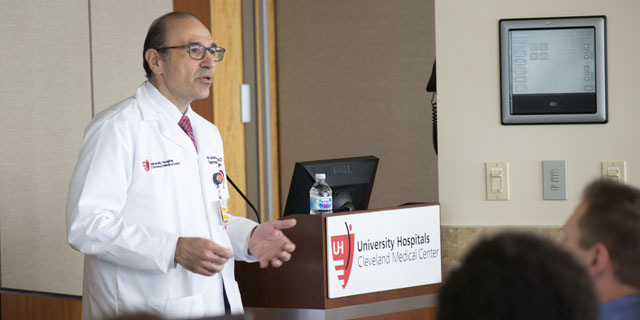Surgery Residency Goals and Objectives

The professional development of a surgeon at Case Western Reserve University/University Hospitals Cleveland Medical Center General Surgery Residency Program is about much more than learning the technical performance of a procedure. It must include:
- Participating in determining or confirming a diagnosis
- Thorough preoperative evaluation and preparatory care
- Immediate postoperative and long-term follow-up care
Our goal is to prepare a resident to function as a qualified practitioner of surgery at the highest level of performance expected of a skilled and competent general surgeon. The surgical resident must be committed to providing exemplary quality of service to patients, performed in concert with educational activities, in order to graduate as a well-rounded and knowledgeable surgeon.
All trainees are expected to achieve competence in:
- Interpersonal and communication skills
- Medical knowledge
- Patient care
- Practice-based learning and improvement
- Professionalism
- Systems-based practice
In order to accomplish these goals, the following objectives have been established:
Patient Care Training Experiences
Technical skills: The surgical resident must develop good technical skills commensurate with his or her level of training. Clinical skills: The resident must possess superb history and physical examination skills, exhibit diagnostic acumen and have the ability to plan, implement and evaluate therapy in an efficient, organized and cost-effective manner.
Foundation of Fundamental Surgical Knowledge
The resident must acquire a solid foundation of fundamental surgical knowledge. He or she also must develop sound medical and surgical judgment with decisions based on a solid foundation of knowledge and a thoughtful, reasoned approach to problems. A grasp of biology, particularly as it relates to surgical disease, and an understanding of the etiology, pathogenesis, diagnosis and management of surgical problems is essential.
Residents must accomplish such understanding before advancing to a level of supervised, semi-independent patient management and operative care. Residents will acquire the necessary knowledge through a program of self-study and personal growth together with an organized curriculum and close association with the faculty.
Practice-Based Learning and Improvement
The resident must evaluate his or her own patient care and outcomes. Knowledge gained from personal experience and the appraisal and assimilation of scientific evidence must be applied to improve patient care.
Interpersonal and Communication Skills
The resident must:
- Communicate effectively with other healthcare providers
- Develop the ability to effectively counsel and educate patients and their families
- Effectively document patient care and practice activities
- Develop and use good teaching skills
- Assume responsibility for teaching both students and residents
Professionalism
The resident must:
- Maintain the highest moral and ethical values
- Be trustworthy and conscientious
- Maintain a professional, mature attitude and demeanor
- Show compassion and respect for patients
- Exhibit preparedness, initiative and reliability both in learning and in the care of patients
- Be willing to accept direction, recognize limitations and assume responsibilities proportionate to ability
Systems-Based Practice
The resident must demonstrate an awareness of the larger context and system of healthcare and effectively call on system resources to provide optimal care.


